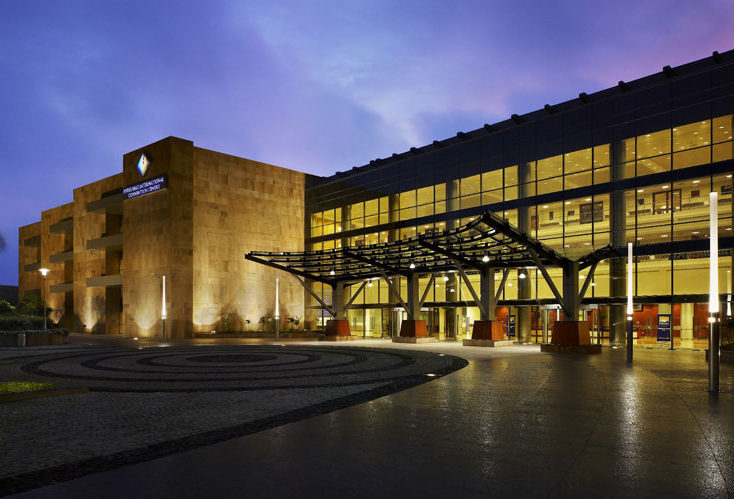Venue – how to find a suitable match
Thursday July 2, 2020 | By Ratika B.
Whether you are hosting a conference, exhibition, wedding, concert or a large meet-up, finding the perfect venue that understands and shares your commitment to sustainability is more than half the battle done. Most smart venues today are realizing the need to embrace sustainable practices and are doing great work in beneficially engaging with the community and environment around them.
Third Party Certification
If a venue is certified, then you know that they have been audited and are actively implementing sustainable practices. A number of green certifications exist globally that can be applied to almost everything from construction standards to how ethically a product or ingredient is sourced. One of the most highly regarded certifications is LEED – Leadership in Energy & Environmental Design, which is conferred by the US (and now Indian) Green Building Council. Following a series of rigorous testing and evaluation in regards to their “green” efforts, venues are awarded silver, gold, or platinum status.
ITC hotels have long been the forerunners in their commitment to sustainability, setting benchmarks in energy and water efficiency, solid waste recycling, and carbon reduction. ITC Maurya, Delhi has received the highest distinction of being certified LEED® Platinum in the Existing Building category.
Sustainability Policy and Procedures
Leading venues are embracing standards, leading to certification, such as ISO 14001 to help reduce environmental impacts, reduce waste and be more sustainable, ISO 50001 to help cut energy consumption and more specifically, ISO 20121 which details out requirements for a sustainability management system for any type of event or event-related activity.
Successful conservation and recycling efforts of The Hyderabad International Convention Center have earned it an ISO 14001 and Green Globe Certification among many other national and state awards.
Sustainable Venue Selection Checklist
Even if a venue has not yet been certified, your venue partner can still help you tremendously in creating a spectacular event whilst maintaining your sustainability goals.
Here are some things to consider when going for a venue site inspection.
- Accessibility: For most event planners, this is a no brainer. Choose a central venue that attendees can get to easily, wherever they may be coming from. Make sure there are good public transport links and last mile connectivity. Promote or provide transportation like cycles, e-rickshaws, shared cabs or busses (be mindful of fuel usage and try to use greener vehicles where available).
For larger events think about parking and whether there might be traffic disruptions, and how that can be managed properly. Another very important aspect of accessibility that some might miss out on, is to ensure easy passage in and around the venue for people with disabilities. Check on ramps, guide rails and bathroom facilities.
- Multi-facility: It’s always a great choice to have a venue that can offer multiple event spaces such as gardens, meeting rooms, banquet halls, boardrooms, as well as accommodation and multi-specialty restaurants for catering. This will not only help to lower cost, but also hugely reduce event carbon footprint due to transportation and management of multiple set ups.If not in the same venue, then find spaces that are within a short distance of each other (ideally walking distance), with some interesting experiences thrown in as people move from one venue to another.
- Sustainable Services: Small changes made by a venue can have a large impact on the environment. Having water stations or using refillable glass bottles instead of offering plastic bottles, washable cloth napkins instead of disposable paper ones, decorating with potted plants instead of cut flowers, not using straws or single-use plastic cutlery, all go a long way in creating positive change.See what your venue of choice already practices and request them to comply with the ones they don’t; they would definitely appreciate your suggestion to reduce your/their event carbon footprint.
- Responsible procurement: If the venue offers catering services, don’t be shy to speak with the chef about their menu and procurement process. A lot of venues are celebrating the concept of serving fresh, organic and local, either by growing their own vegetables or procuring from nearby farms and local suppliers. Celebrate the cuisine of the region or use local ingredients in exotic dishes, work with the venue in planning your food menu to avoid wastage and reduce the food miles (I can almost hear you groan about having another thing to worry about, besides just air miles).
- Waste Management System: Venues cannot control the amount of waste produced by guests, but most are working towards having an effective waste management, diversion and recycling program. Check how your venue manages waste. Are there multiple, easily accessible and clearly marked bins placed around the venue? Is there an on-site composting facility? How do they handle food wastage? These are some pertinent points that can help you make better choices.
- Water Usage: Water scarcity being a global problem, it is important to know how the venue is addressing water use and conservation. Rainwater harvesting and/or greywater recycling to be used in toilet flushes or watering the gardens is becoming more common. Low-flow technology installation can save huge volumes of water across bathrooms and kitchens, as does the system of not replacing linen and towels daily (unless specifically requested by guests).
- Energy Efficiency: A lot of venues have started drawing their power from clean sources, others are using their roof or other unutilized spaced to install solar panels, still others are creating green or living roofs for benefits beyond just better insulation. Simpler methods include switching to energy efficient LED lights, using energy star certified equipment, conserving energy used in heating or cooling by installing double-glazed windows.The simplest method for you to reduce the energy usage in your event is to choose a venue with lots of natural light (unless of course you need a dark space)
- Carbon Offsetting: A lot of venues have programmes to offset their carbon footprint, Some can help to calculate your event footprint so that you can choose to offset through your own preferred programme.
- Community Engagement: A very important pillar of sustainability, and of your event, is people. Employees of the venue will be the extended hosts of your event, so don’t ignore these very important people. To be truly sustainable, the venue should be offering employment (either directly or indirectly) to a lot of the local community and be inclusive in their hiring practices without differentiation on basis of race, religion or gender. Many venues use their CSR acts to give back to their region or community.
A 100% sustainable or carbon neutral event cannot be achieved overnight, if it is even at all possible. Sustainability is an ongoing practice, to try and improve the methods that we currently use, to make better choices in how we work and who we work with. Don’t despair if you can’t find the perfect source, just make the best of the resources you have.


